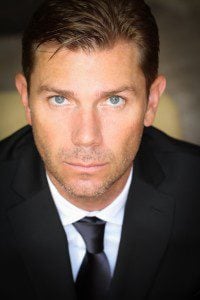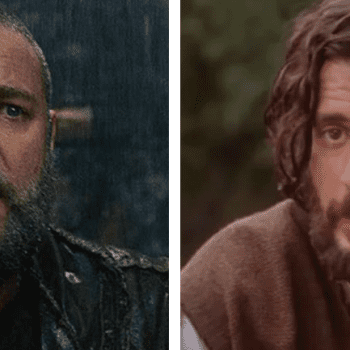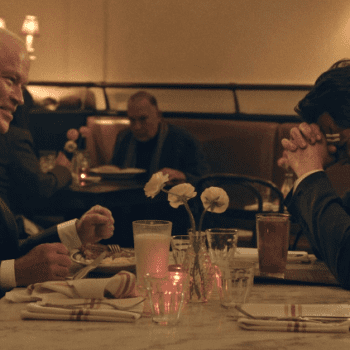The end is near — again! But this time it has more of a young-adult sensibility.
Vanished | Left Behind: Next Generation tells the story of a teenaged girl, her kid sister, and two boys who find themselves stranded in a world that is falling apart after the Rapture takes place. It’s the fifth film to be based on the Left Behind novels written by Tim LaHaye and Jerry B. Jenkins, but it’s also the first Left Behind film to be produced by a member of the LaHaye family. What’s more, Randy LaHaye — whose grandfather Tim passed away two months ago at 90 years of age — not only produced the film but appears in it as the Antichrist, Nicolae Carpathia.
The film will premiere next week when Fathom Events hosts a screening for one night only, on September 28, in theatres across the U.S. Tickets are available here.
I spoke to Randy LaHaye by phone about the film, his plans for sequels, whether it was fun to play the Antichrist, and how he intends to go ahead with a movie about the Resurrection that his grandfather first started developing at least ten years ago.
What follows is a slightly edited transcript of our conversation.
–
 If I’m not mistaken, there have been five films based on Left Behind, one way or another, but I think this is the first one that was done with the direct involvement of the LaHaye family. Is that correct?
If I’m not mistaken, there have been five films based on Left Behind, one way or another, but I think this is the first one that was done with the direct involvement of the LaHaye family. Is that correct?
LaHaye: That is very correct, and you’re the first outlet to articulate that to me, as opposed to vice versa. So I don’t know where you got that info, but it’s great to hear you say that!
Well, I’ve seen all the films, and I’ve been writing about them for a while. I remember that your grandfather didn’t care for the original films that were made around the turn of the century, but he did endorse the one that came out a couple years ago, but even then, I don’t think he actually produced it, as such.
LaHaye: Yeah, he endorsed it because he just wanted to see it do well and reach people, but he absolutely endorses this one, and I think that’s the cool thing for me, as his grandson, and I was able to show it to him before he passed away.
So how did that come about, that you got directly involved in making this one?
LaHaye: Well, we had always talked about wanting to do a Left Behind movie outside of Cloud Ten [the company that made the earlier Left Behind films]. My grandfather has always had a heart for kids, which is why when Left Behind became popular and started becoming very impactful in its outreach, he and Jerry Jenkins created Left Behind: The Kids series. And so those books we took and kind of reimagined them, as a YA thriller about three years ago, and really, the idea — I like to think that God gave me the idea, I give all the glory to him — and how it happened was, I was watching the movie Twilight, and it just kind of hit me, like, kids today have no idea what Left Behind is, but they love these YA movies, and they always have a dystopian type world to them, so I just thought it would be a great idea to kind of introduce the Left Behind concept to a new generation by doing a YA thriller, using the touchstones of the Left Behind books, and my grandfather’s interpretation of Revelation to do it. So Vanished is the first film of the new franchise, Left Behind: Next Generation.
So you’re planning on doing sequels, or follow-ups?
LaHaye: Well, I would certainly love to, and I’m praying every day that we are afforded the opportunity to do so. That has a lot to do with how the first film performs, and that’s one of the reasons I’ve been doing everything I can to publicize our theatrical event night, September 28, in theatres across the country.
How old were you when the first book came out 21 years ago?
LaHaye: I was 18 years old. Well, yeah, 17 years old.
So you were actually the target age for this new movie, I guess.
LaHaye: (chuckles) I was the target age, 20-plus years ago, for this movie now!
So did you follow the books when they were coming out? Or, as the grandson of Tim LaHaye, did you sort of have this feeling of, “Well, I already know what the books are about, I don’t need to read them”? My wife sometimes says she doesn’t read my articles that often because she’s heard me say most of my ideas before they get published anyways.
LaHaye: You know, the truth is– I like this interview. You’re asking some very interesting questions. I get a kick out of it. I personally never read any of the Left Behind books when they were popular. It wasn’t until about ten years ago that I picked it up and read it, and I read every single book in the series in one year, not because I had to but because I wanted to. I was probably like everybody else. I said, “Oh, I want to see what the craze is all about,” so I picked up the original Left Behind, and I was instantly sucked in and had to know what happened next.
So when you say you read every book, is that including the Kids spin-off books as well?
LaHaye: Yes. I didn’t read all of the Kids series, but I read a lot of them.
So whose idea was it to make this film, then? Was it yours after you finished reading all the books, or did whoever owns the rights right now come to you and say, “We’re making this movie, would you like to be involved?”
LaHaye: It was my idea. The thing about the Left Behind series that caught my attention, even as a young man, was letters would come in to my grandfather when the series was popular, and people would write him, and there was a throughline to all these letters, which was: they loved sharing with my grandfather how much they enjoyed giving the books to their unsaved friends and families, because it got unbelievers sucked into the story and out of it, organically, they were all kind of sparked to ask deeper eternal questions of faith in their own lives, and those questions led to conversations of people giving their lives to Christ. And that powerful outreach that the Left Behind series became I think was missed in some of the earlier films. So looking at today’s generation, kind of the entertainment landscape, these movies, these YA movies like Hunger Games, Divergent, Maze Runner, Twilight, they really resonate with tweens and teens, and tweens and teens today have no idea what the Left Behind book series is. So it was my idea to reintroduce Left Behind in kind of that YA genre of films. I knew that fans of the books would love the movies, and they do. This movie is for everyone, but it’s specifically targeted for tweens and teens today. It’s a longwinded answer, but that’s the root of it.
In terms of the kinds of stories you tell, the main Left Behind series of books has people who are constantly in close contact with the Antichrist — they sort of have a front-row seat to all the events that are spelled out in Revelation or whatever — whereas this movie is kind of about people who are sort of way off on the sidelines. They’re just kids in a city wandering out into the country, etc. Maybe I’m wrong, but they presumably wouldn’t get up close like the pilot of the Antichrist’s plane or the globe-trotting journalist.
LaHaye: Exactly. Well that’s a very insightful observation, and I took that from the Left Behind: Kids books. Left Behind: Kids is very similar, in the start of that series. It’s not so much about the geopolitical landscape or the in-depth revelation of the theology behind it all, it’s more about the kids trying to survive and trying to learn the truth about what happened. Now, I have to say, that’s how we did this first movie, to introduce the Rapture and the kids, and we introduce the Antichrist at the end. But as the series evolves and we come out with more of these and start to tell the whole story, they will become directly involved with everything that’s going on, just like the adult series.
How did you come to the decision to play the Antichrist yourself? It might seem kind of odd to have one of the LaHaye family members playing the Antichrist in a movie like this. How did you make that decision, to do that?
LaHaye: I’ve been an actor for many years, have done things in Hollywood — commercials, television spots, I’ve done a few independent movies — and I want to be careful how I say this, I don’t want to belittle our film or anything, but having read all the books, having spent time with my grandfather kind of delving into biblical prophecy, I know the character very well, and I think oftentimes he can be portrayed as a kind of clichéd, two-dimensional character. Like, you see him, you instantly know he’s the Antichrist, he’s the bad guy. So I wanted to bring something to it which was a little bit original and different, and we’ll kind of explore more as the series goes on, but really, it was just because I have a grasp on that character and how we want to develop it. And it was my producing partner, Dave Johnson– I was originally thinking about playing Pastor Bruce Barnes, and as we started hanging out, Dave just threw it to me, maybe a couple months before we were filming, he said, “You know, Randy, I think you could do an incredible interpretation of the Antichrist.” At first I was like, “Whoa! I could never play the Antichrist!” But as I talked to my wife and started thinking about it, it was like, man, you know, ultimately I really want to just make a great movie, and just like Star Wars — without Darth Vader, there is no movie, he is such a great component of the movie. So I started thinking about how I wanted to portray Nicolae Carpathia, and I kind of got excited about portraying him in a way that he would be just somebody that when Christ comes at the end and destroys him, it’s going to be a great scene. And I wanted to be able to fill that out and build that up.
Actors often say it’s fun to play the bad guy, they enjoy playing the bad guy. Would you say that about playing Nicolae? Is it fun to play the Antichrist? Do you enjoy playing the Antichrist?
LaHaye: Well, I enjoy acting. It’s all make-believe, and it’s all a fictitious depiction, and I would say yeah, I do, a hundred percent. I had a great time. One of my favorite things to do was writing the speech for Nicolae Carpathia. Getting into what I was saying about how I wanted to have him depicted? I don’t want him to be this kind of clichéd version of Nicolae. I can tell you this: I took a lot of the speech that’s in the movie directly from President Obama’s UN address. I wanted to make it relevant and make it feel like this isn’t just something that instantly they go, “Oh, he’s the Antichrist,” but it’s like, “Oh wow,” to maybe, like, secular folks or left-wing liberals. They would hear that speech and go, “Yeah, actually, that makes perfect sense. I am with that guy.” And so I enjoy kind of the artistic process of creating the character, both on the page of the screenplay and then acting it out, because I know that I can do that.
The character in the book is from Romania, but you don’t speak the lines with a Romanian accent. Was there a thought behind that?
LaHaye: Yeah, there was. First of all, the thought is, we hear Nicolae from the perspective of our kids, but what we’ll learn as the series goes on is everybody hears Nicolae in their own language. So if you’re speaking Arabic or you’re speaking Italian, whatever, you’re going to hear him speak that way. And we didn’t introduce that in this movie, but we will as future films come out, and that’s kind of one of the powers that Nicolae possesses.
It was interesting, too, to see how certain elements have been updated. When the kids go into the church, they’re given flash drives, whereas twenty years ago it would have been videotapes.
LaHaye: Yeah, it would have been VHS tapes, and we would have instantly lost our audience! We’re going to do a lot more of that as the series progresses, kind of making it feel very relevant and like the world we’re living in now, all the technological advancements and so forth.
I just found myself wondering if there are churches that actually keep things like this on flash drives, or maybe there already are videos like that on YouTube, you know?
LaHaye: Oh yeah. You know what, my grandfather created a whole movement twenty years ago with these books. I heard about people who were taking all the books in other languages and burying them in time capsules, leaving them in the trunk of cars, thinking the Rapture was going to happen and then people would find them, and pastors read the books, saw the movies and thought, “Oh, that’s a great idea, I should do that, share the same theology as pretribulation Rapture.” And so they did that, and I think that’s great. I just like the idea that it’s sparking conversation about this kind of stuff.
What do you make of the way that stories about the Rapture have begun to penetrate the secular world — secular stories, like HBO has The Leftovers, for example. What do you make of that phenomenon?
LaHaye: (chuckles) Yeah, The Leftovers. When I heard about The Leftovers, I just kind of laughed to myself, because I know that that show exists because the Left Behind book series was so successful, and they took the Left Behind book series and they tried to make a secularized HBO show out of it, and I just kind of laughed, thinking that would never really amount to anything, because where are they going to go with that story? There’s nowhere to go. The people disappear, and then what? Why did it happen? The secular Hollywood storytellers are going to do what they always do, which is take great stories from the Bible and twist them, and make them their own. And this is the way I feel about it: I feel that great storytelling — films produced of the highest quality — are the most powerful vehicle to the human mind ever invented, and for far too long, I feel like Satan and his dark armies have been using that medium to propagate their agenda, and I’m not against that medium, I’m for it, and I think as Christian filmmakers we should come together and try to really up the game and produce very high quality movies that further the glory of God, and evangelize to this generation in a powerful way, using a medium and a language today’s generation relates to and understands. And so I can’t really speak to what I think about movies or shows that are based off Left Behind, and maybe there will be some that spur from what we’re doing with this new generation series — God willing, it becomes successful, then that will probably happen — but we just want to get in front of it and tell our story to glorify God.
I did want to ask about other films you might be working on. I have a particular interest in movies that are based on the Bible, and I remember reading a story about three years ago that said you were trying to raise money to make The Resurrection. Can you comment on what the status of that is right now?
LaHaye: Yeah, I can. The film Risen kind of took a little wind out of our sails for the theatrical release, but the same partner who I partnered with on this one, Dave Johnson — he was the producer and writer of the two PAX network hit shows Sue Thomas: F.B.Eye and Doc — he and I share a very similar vision for what we want to do with these types of films, and we are right now in the process of creating a very high-concept, high-quality documentary exploring the Resurrection that would be produced for a few million dollars and have a theatrical release. So that’s kind of what our next project is, other than the sequel to Vanished.
So The Resurrection would be a documentary now. Was it always envisioned as a documentary?
LaHaye: No, we have a script for a theatrical picture, but I just feel like, given that we’re living in the wake of Risen, we probably need to wait a couple years before we go out and raise money for it, because it’s a thirty million dollar movie, so we’re just going to kind of wait, and I think the documentary will actually lay some groundwork for the theatrical picture as well. I always knew the documentary would be in conjunction with the theatrical film, I thought maybe the documentary would come later to support the theatrical film, but I just feel like God’s telling us we should do the documentary first now, so that’s where we’re going.
Mel Gibson has also been talking lately about doing his own movie on the Resurrection.
LaHaye: Mm-hmm.
So would that be competition for you too, do you think?
LaHaye: Well, no. I mean, listen, as long as it’s biblical, there can never be enough movies, in my mind, on the Resurrection. And I think if movies are done well, they’ll succeed. If they’re great movies, they’ll succeed. Nobody ever said, “I’m not going to go to that movie, even though it’s a great movie, because I’ve already seen the story.” People go to movies because they’re great movies, and second of all, it’s the story. I honestly pray, I hope to God, that Mel Gibson does the Resurrection story, because nobody could do it the way Mel Gibson could. Now that doesn’t mean it’s going to be the best biblical representation, but it’s going to be powerful. Mel Gibson is, like, he’s up there for me. He is the most talented filmmaker I’ve ever, ever met, and I just wish him the best, and no, it’s not competition for me. It’s great news. And if his movie is coming out around the same time our documentary is going to be coming out, I think it will work in conjunction with it. So I really am praying he does produce and direct The Resurrection. Can you imagine? Especially if he did it in Aramaic, and it really was the true follow-up to The Passion of the Christ. That would be just so awesome.
That would be. And I don’t know if you’ve heard this, but he gave an interview recently where he said his idea for his Resurrection movie will include flashbacks to the Old Testament, I guess to show the fulfillment of prophecy. That seems to be the direction he’s going.
LaHaye: Oh, that’s awesome. Yeah, I had heard some of those things. But you have to understand, I’ve been in this business a long time, and I’ve been hearing rumours of Mel Gibson doing The Resurrection for over ten years. And I do know he is streamlining it now, and he’s got investors, and there’s a script floating around, and so it’s becoming more of a reality. But I can’t concern myself with that too much. But I am a big fan of Mel Gibson, and I do pray that he does do The Resurrection, because it’s needed. He’s the guy. He’s the guy that made The Passion, and that movie changed my life. That movie made me realize how powerful films can be.













